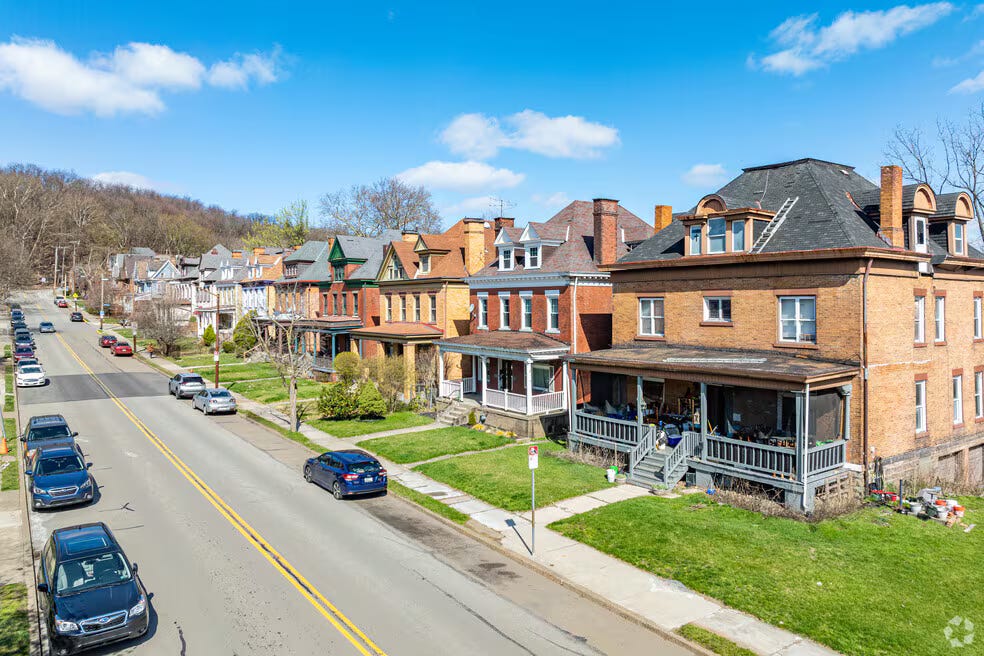What we lost when we lost the front porch
Morningside is a small neighborhood in northeast Pittsburgh where one of my best friends grew up. It’s the neighborhood he and most of his family have lived in since they came to the US from Italy.
The modest houses huddled close together, as if in preparation for the harsh Pennsylvania winter. They are walking distance to a few shops, restaurants, a grocery store, and most importantly, a Catholic parish.
When you visit Morningside, you can imagine families on Sunday morning, walking to Mass. They pass by other families sitting on their porches who reluctantly rise, peer-pressured to go to Mass themselves. You can imagine Wednesday nights after work. Dad smoking. Mom hanging out laundry. Kids playing in the street.
All of this from the view of a large, generous front porch.
They don’t make houses like that anymore.
On modern homes, the front porch is just a small alcove big enough for Amazon packages. The porches in Morningside are large, meant to accommodate several people. With such small interiors, you wonder why so much space was dedicated to the exterior. But it’s because the front porch was built for something other than the comfort of the residents. The front porch was built for the neighborhood.
And when we lost the front porch, we lost something crucial.
For the residents of Morningside—and for most towns and suburbs built like them—the porch was the mediator between the home and the neighborhood. It was a place where surprise guests could drop by. Where you could see someone you haven’t seen in a while and have a conversation. Where you could build relationships with your neighbors.
The front porch was certainly “mine,” but it could become “ours.”
It also served a practical purpose. Before air conditioning, on a hot day, there was no place to go but outside. Windows open, watching the kids. But as homes were retrofitted with central air conditioning and with the rise of television, the residents of Morningside—and every suburb in America—started moving inside and stopped meeting each other on the street.
We moved from the front porch to the living room. Or to the back porch with large privacy fences so that we can enjoy nature without the inconvenience of our neighbor.
Instead of the porch, the television became the shared cultural space. Instead of shared conversations with the neighbors about local issues—what’s going on at the church, what family needs help, who’s getting married—your after-work activity was watching shared conversations between celebrities about national issues.
Our shared cultural space became less local and more national. Our shared cultural language was no longer being determined by the members of our local parish but by corporations in Los Angeles and in New York.
When we lost the front porch, we lost our locality. We lost the web of in-person relationships that make a community strong.
Now, with the dawn of customizable algorithms and moving from the television to the phone, we’re losing even that shared national cultural language. We don’t all watch the same things. We don’t all talk about the same things. We don’t believe the same things.
We’re all missing each other.
This has implications for our Catholic parishes. The fabric of Catholic parish life was held together by walking past each other’s houses on Sunday to go to church. And now we don’t have that anymore.
Catholic parishes need to provide what the front porch once did, or at least try.
We can’t rebuild our neighborhoods into Morningside. But Catholic parishes can reshape themselves to provide what the front porch once did. Sunday can become a day where people spend their day at Church. We can make our parishes the kind of place where people want to hang out. Then, they’ll run into one another and serendipity can happen once again.
The isolation of mass-media technologies is only getting worse.
Catholic parishes need to act.




Near the former St Raphael Church? Morningside is very similar to my old Pittsburgh neighborhood, Brookline. Most of the neighbors belonged to Resurrection parish (“Ressi”). Good memories of sitting on the front porch with my parents and siblings. My brother would play his guitar and my dad accompanied in the harmonica. The rest of us would sing along. I miss those days!
Great read. The old front porch was a threshold.
A place where inside and outside touched. People forget that communities are not built by big gestures but by these steady crossings of one life into another. It gathered people without forcing them. It allowed presence without intimacy.
Maybe that is what modern life eroded. We kept our houses but lost the middle places that teach us how to connect with one another.